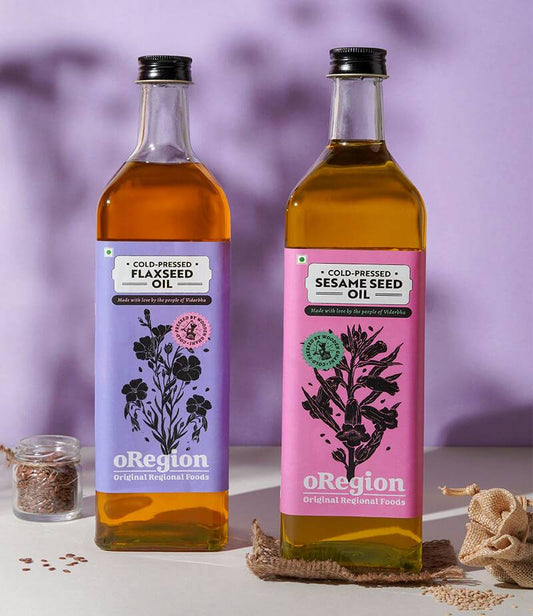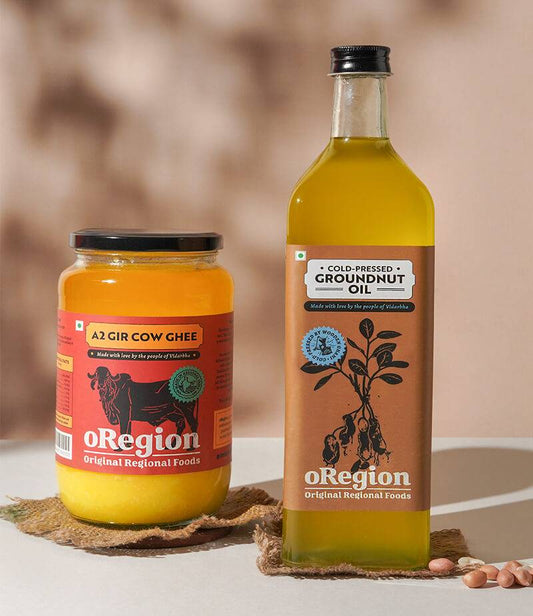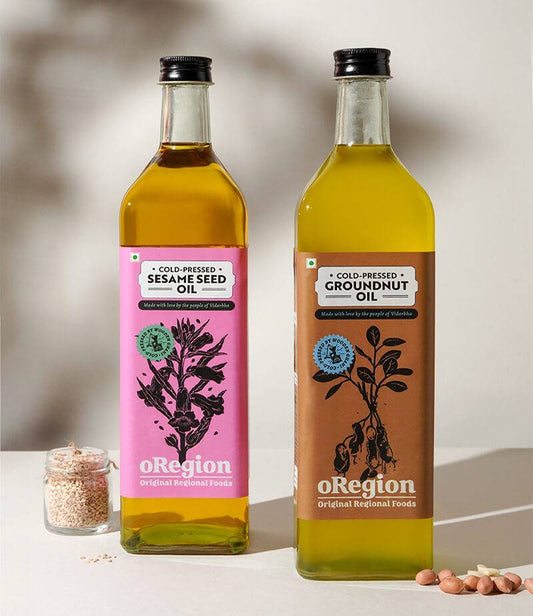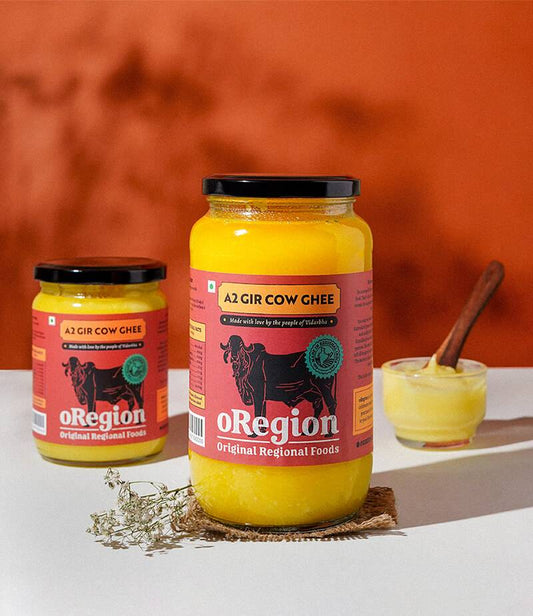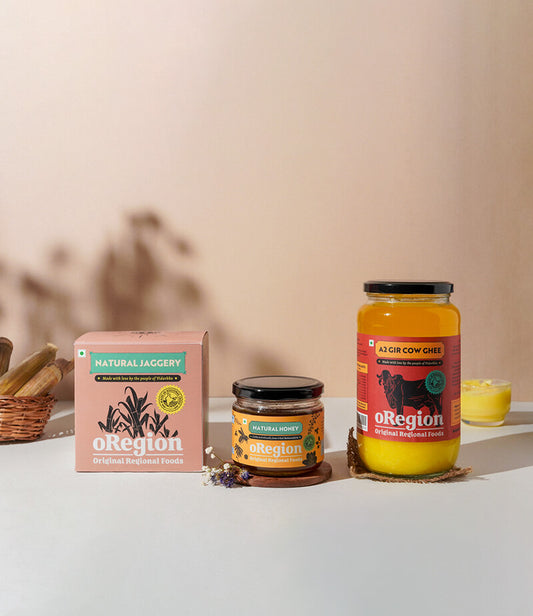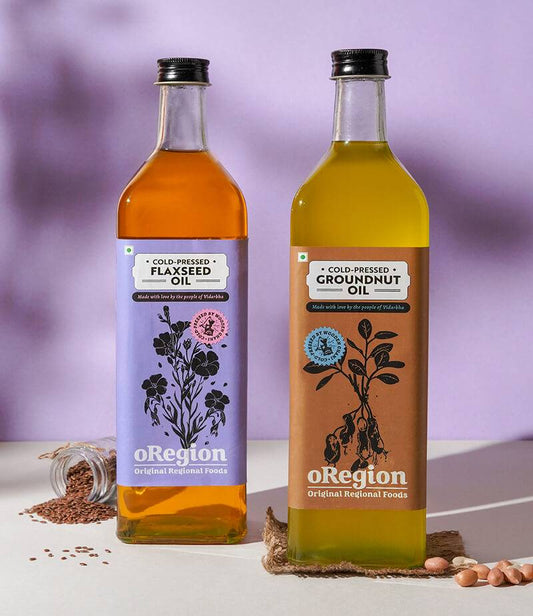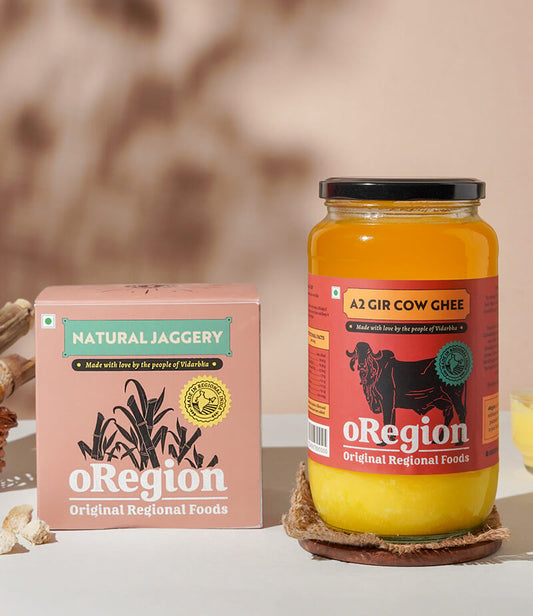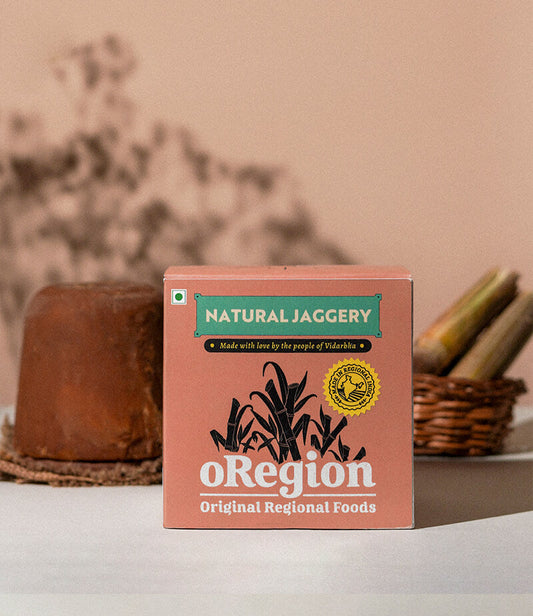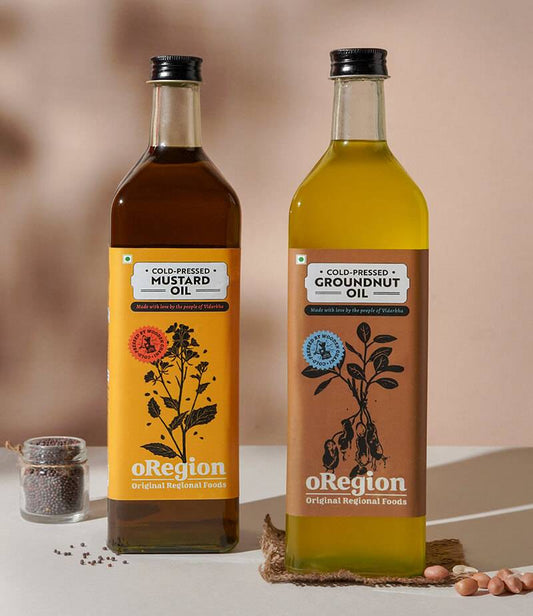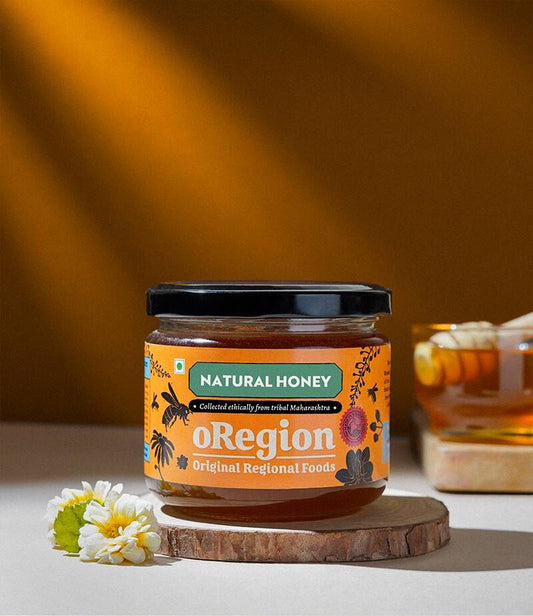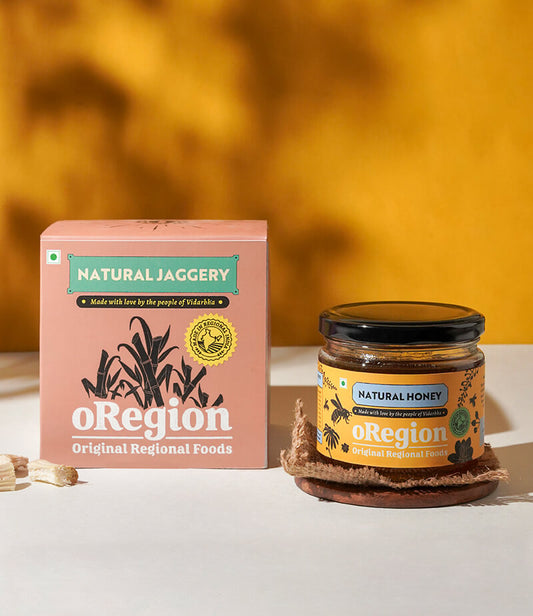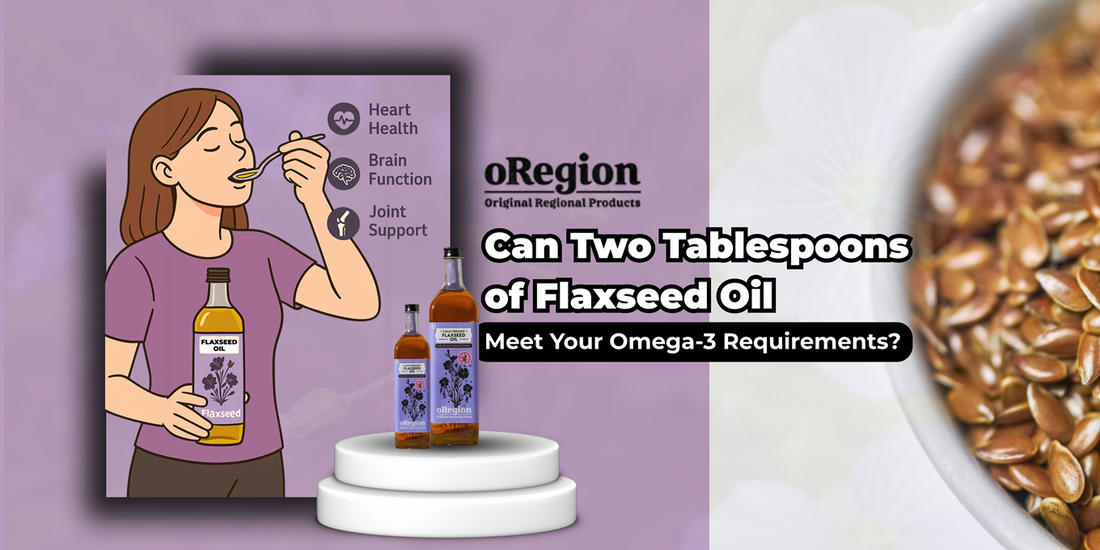
Can Two Tablespoons of Flaxseed Oil Meet Your Omega-3 Requirements?
By oregion foodsWhen it comes to Omega-3 fatty acids, the conversation often revolves around fish oil. But for vegans, vegetarians, and those seeking sustainable plant-based options, Cold Pressed Flaxseed Oil stands out as a powerful alternative. The question is — are two tablespoons of flaxseed oil enough to meet
your Omega-3 needs? The answer is yes, but with an important condition: you must ensure your body has the right supporting nutrients to use it effectively.
Understanding Omega-3 and Why It’s Essential
Omega-3 fatty acids are essential fats, meaning the body cannot produce them and must get them from food. They play a critical role in:
-
Brain development and function
-
Reducing inflammation
-
Maintaining heart health
-
Supporting vision and eye health
-
Improving mood and mental well-being
There are three main types of Omega-3:
-
ALA (Alpha-Linolenic Acid) – found in plants like flaxseed oil.
-
EPA (Eicosapentaenoic Acid) – found in fatty fish and some algae.
-
DHA (Docosahexaenoic Acid) – also found in fish and algae.
While EPA and DHA are bioactive, ALA from flaxseed oil must first be converted by the body into EPA and DHA before it can perform its full range of health benefits.
Read More: Why Are Women with PCOS & PCOD Turning to Flaxseed Oil
Flaxseed Oil: A Plant-Based Powerhouse
Cold-pressed flaxseed oil is one of the richest natural sources of ALA. Just two tablespoons contain about 14 grams of ALA — that’s nearly 875% of the daily recommended intake for men and over 1200% for women.
But here’s the catch: only about 5–10% of ALA converts to EPA, and 2–5% converts to DHA. This conversion rate is often cited as the reason some people doubt flaxseed oil’s effectiveness. However, the process can be greatly improved with the right nutritional support.
Why Conversion Matters — And How to Improve It
For ALA to work in the same way as fish oil Omega-3s, the body must convert it into EPA and DHA. This process depends on certain cofactors — vitamins, minerals, and proteins that help enzymes work efficiently.
1. Vitamin B6 – The Metabolism Enabler
Vitamin B6 is a crucial cofactor in the enzymes that convert ALA to EPA/DHA. Without enough B6, the process slows down dramatically. B6 also supports hemoglobin production, brain function, and immune health, so getting enough has benefits far beyond Omega-3 metabolism.
Food sources: bananas, spinach, sweet potatoes, chickpeas, fortified cereals.
2. Zinc – The Overlooked Essential
Zinc is often underestimated in its role in Omega-3 conversion. It’s necessary for enzyme activation, immune defense, wound healing, and skin health. Many people, especially vegetarians, may have low zinc levels, limiting ALA conversion.
Food sources: pumpkin seeds, cashews, lentils, chickpeas, almonds.
3. Protein – The Enzyme Supporter
Enzymes are made of protein. Without adequate protein intake, the body can’t produce enough of the enzymes needed to convert ALA effectively. Beyond that, protein supports muscle repair, hormone regulation, and immune strength.
Food sources: quinoa, tofu, lentils, Greek yogurt, eggs (for non-vegans).
Daily Omega-3 Requirements and Flaxseed Oil
According to nutrition guidelines:
-
Women: 1.1g ALA per day
-
Men: 1.6g ALA per day
Two tablespoons of flaxseed oil provide 14g of ALA, far exceeding the daily requirement — even accounting for the low conversion rate. This means that if your B6, zinc, and protein intake is adequate, flaxseed oil can fully meet your Omega-3 needs.
Flaxseed Oil vs. Fish Oil — Which Is Better?
Fish oil contains preformed EPA and DHA, meaning no conversion is needed. However:
-
It’s not vegan-friendly.
-
Some brands come from unsustainable fishing practices.
-
Fish oil can be oxidized by the time it reaches consumers.
-
Certain fish oils may contain mercury or other contaminants.
Flaxseed oil, on the other hand:
-
Is 100% plant-based and sustainable.
-
Contains zero mercury.
-
Provides fiber, antioxidants, and lignans in whole seed form.
-
Supports environmental and ethical food choices.
Read More : Flaxseed vs Fish Oil: Omega-3 Absorption & Purity
Overcoming Common Myths About Flaxseed Oil
Myth 1: “Flaxseed oil can’t replace fish oil.”
Truth: With the right supporting nutrients, flaxseed oil can meet Omega-3 requirements for most healthy individuals.
Myth 2: “You need huge doses to see benefits.”
Truth: Two tablespoons can provide more than enough Omega-3 required for the day..
Myth 3: “Conversion rates make it useless.”
Truth: Nutrient synergy (B6, zinc, protein) can significantly improve conversion efficiency.
Lifestyle Tips to Maximize Omega-3 Absorption
-
Pair with nutrient-rich meals – Include foods high in B6 and zinc daily.
-
Store flaxseed oil properly – Keep it in a dark, airtight container in the fridge to prevent oxidation.
-
Use in cold dishes – Add to salads, smoothies, or drizzled over cooked meals; avoid heating to preserve nutrients.
-
Stay hydrated – Water supports metabolic processes, including fat metabolism.
-
Balance your Omega-6 intake – Too much Omega-6 (from refined oils) can compete with Omega-3 metabolism.
Who Should Consider Flaxseed Oil as Their Main Omega-3 Source?
-
Vegans and vegetarians
-
People allergic to fish or seafood
-
Eco-conscious consumers
-
Those concerned about mercury and pollutants in marine oils
The oRegion Approach to Omega-3 Education
At oRegion, we believe in transparency, evidence-based nutrition, and empowering customers with knowledge. When a customer asked, “Is two tablespoons enough?”, we researched deeply — not only confirming that it’s sufficient but also uncovering the importance of supporting nutrients.
We now focus on making complex nutritional science simple, helping people of all ages make informed choices about plant-based health.
Final Takeaway
Yes — two tablespoons of organic cold-pressed flaxseed oil can meet your Omega-3 needs if you have enough vitamin B6, zinc, and protein in your diet. These nutrients don’t just help convert ALA into EPA and DHA — they support overall metabolic, immune, and brain health, making them essential in any wellness plan.
No — if you ignore nutrient synergy, the conversion rate will remain low, and you may miss out on the full benefits of Omega-3.
In the end, knowledge is your best supplement. When you understand how your body works, you can make food choices that are sustainable, ethical, and effective for lifelong health.
Follow us for more wellness tips
📸 Instagram: @oRegion.in
📘 Facebook: facebook.com/oRegion.in
▶ YouTube: https://www.youtube.com/@oRegion_foods
👉 Buy Now on oregion.in
